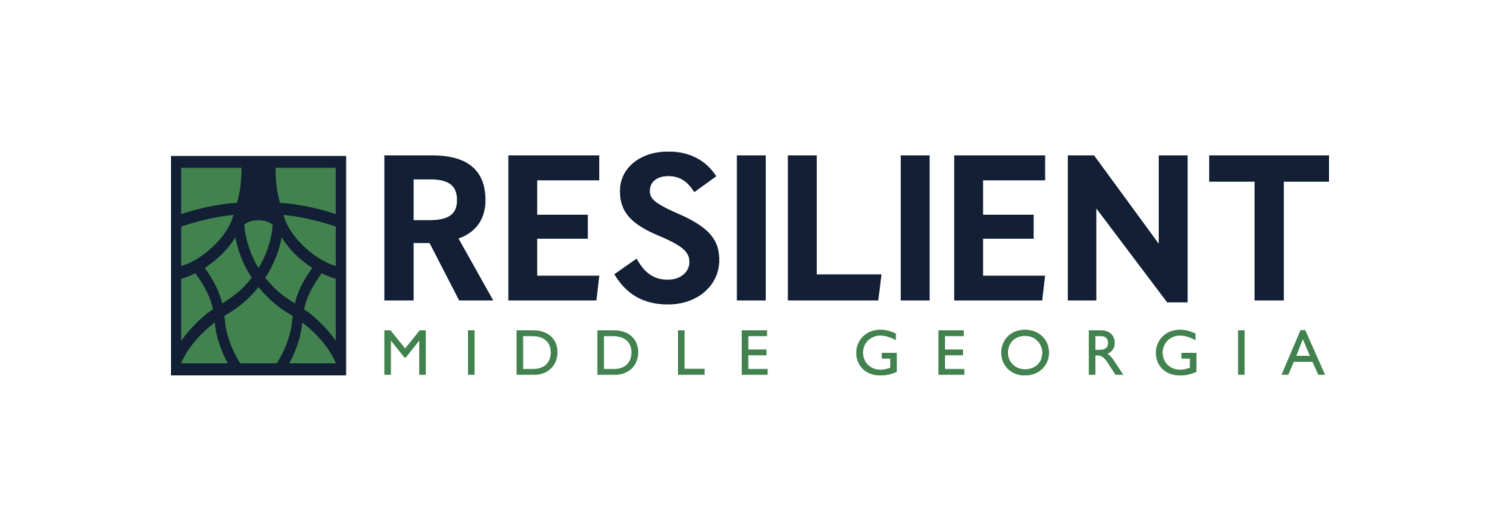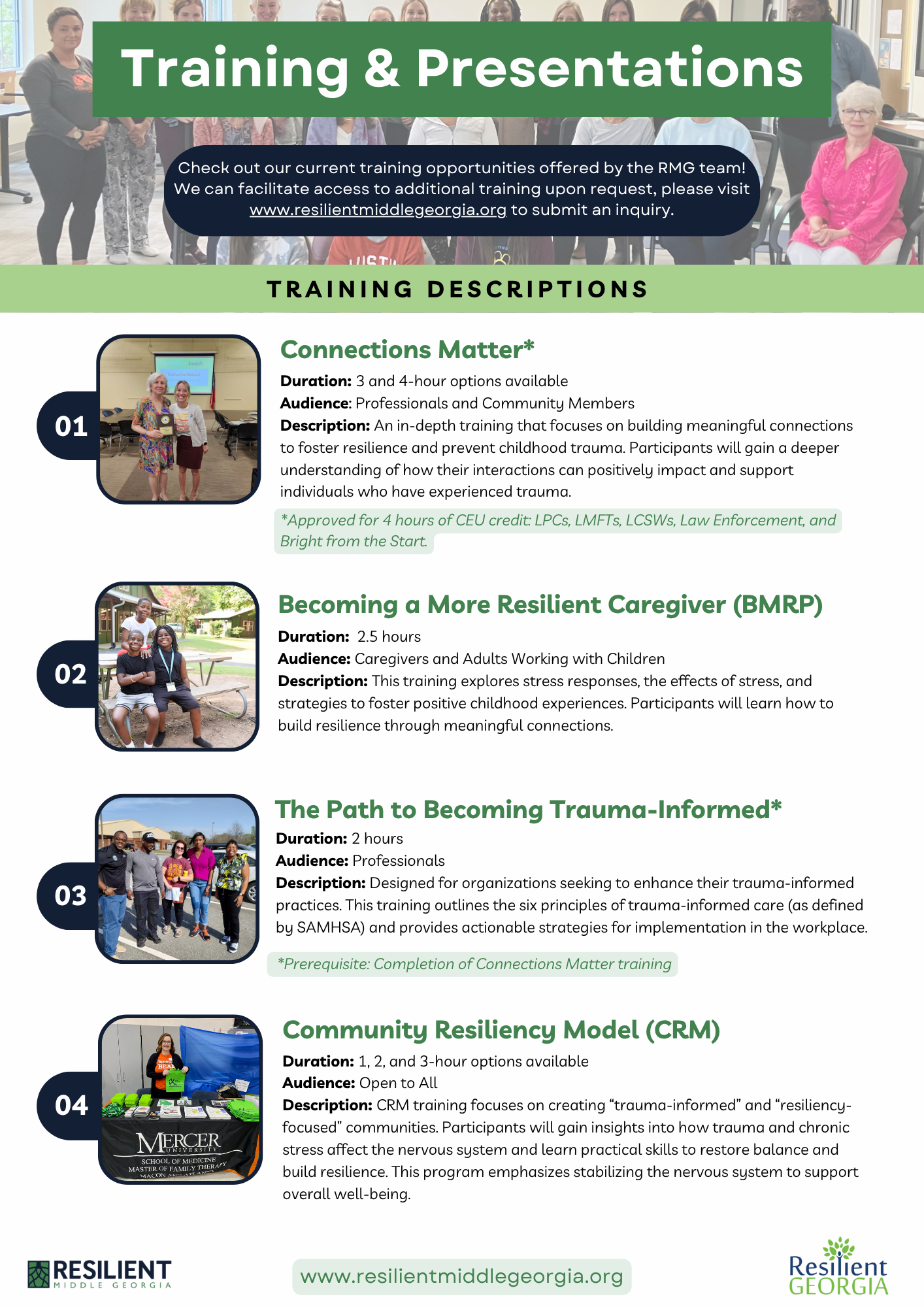
Training Opportunities
Request training that helps you and your community.
Build awareness and knowledge about adversity and resilience.
At Resilient Middle Georgia, one of our primary goals is to connect our community with training that can build awareness and knowledge about adversity, ACEs, trauma, and resilience. These trainings can be broad and community based or specific to a certain stakeholder group (such as law enforcement, teachers, social service agencies, faith based organizations, community leaders, healthcare, mental health providers, and juvenile justice). The following list provides a summary of possible training opportunities that can be supported by the funding at Resilient Middle Georgia. If you or your agency is interested in building awareness and trauma informed practices, please use the Training Request Form to contact us.-

Connections Matter of Georgia
Evidence informed curriculum, adapted for Georgia specific audiences.
Healthy minds enable individuals to reach their full potential. Businesses, child and family serving professionals, faith communities, and individuals can promote trauma-informed environments that help everyone manage stress and build stronger connections within the community. The training curriculum is an evidence informed curriculum, developed using a robust body of literature by Dr. Linda Chamberlain and adapted for Georgia specific audiences.
• Interactive, discussion-based curriculum that helps people better understand trauma, brain development, resilience, and health
• Concrete knowledge about Adverse Childhood Experiences (ACEs) using Georgia data
• Strategies for increasing and improving your own connections and tools for strengthening both personal and community resilience
-

Strengthening Families Georgia
Strengthening Families™ is a research-informed framework and approach to preventing child abuse and neglect. Developed by the Center for the Study of Social Policy, this approach focuses on family and community strengths and Protective Factors rather than risk factors. Protective Factors are what helps children and families thrive despite whatever risk factors they might face. Protective factors aren’t just for families that are at risk for child abuse and neglect because all families benefit from having strong protective factors.
Six individual 2-hour SFG training modules can be presented:
· Overview- An Effective Approach to Supporting Families and Communities
· Parental Resilience
· Social Connections
· Knowledge of Child Development
· Concrete Support in Times of Need
· Social and Emotional Competence in Children
-

Community Resiliency Model
The Community Resiliency Model (CRM)® Workshop introduces participants to six wellness skills. CRM Workshops help create “trauma-informed” and “resiliency-focused” individuals and communities that share a common understanding of the impact of trauma and chronic stress on the nervous system and how resiliency can be restored or increased using this skills-based approach.
The two fundamental goals of CRM are to help adults and children learn to track their own nervous systems in order to bring the body and mind back into greater balance, and to encourage people to pass the skills along to family, friends and their wider community.
CRM can be used as self-care for those community members who are the front-line workers, responding to crisis situations or who live in highly traumatized and/or marginalized communities.
-

Child Welfare Training Collaborative
A variety of trainings are available through Georgia State University's Child Welfare Training Collaborative, including:
· Trauma 101: Understanding the Impact of Trauma on Children
· Brain 101: Understanding the Impact of Trauma on the Brain
· Psychological Safety: A Pathway to Resilience
· Recognizing and Managing Secondary Traumatic Stress
· Trauma to Resilience: Strategies to Support Children's Well-Being
· Unmasking the Trauma of Bullying
· Empathy in Trauma: Delivering Trauma-Informed Customer Service
· Differences are Good! An Exploration of Cultural Competence
· Building Cultural Competence in Professional Practice
-

CDC's Preventing ACEs
Learn how to identify, prevent, and reduce the impact of Adverse Childhood Experiences (ACEs) in your community.
The Veto Violence training, offered by the Centers for Disease Control and Prevention (CDC), equips participants with strategies to define and address ACEs—traumatic experiences in childhood that can have lasting effects on health and well-being.
ACEs are influenced by a range of factors at the individual, family, community, and societal levels. Risk factors include a parental history of abuse or neglect, limited parenting knowledge or skills, and social isolation or violence within families and communities.
Research also highlights protective factors that can reduce the risk of child abuse and neglect, such as nurturing, safe, and stable family relationships, strong community support, and access to health and social services. Through this training, participants gain practical tools to help foster resilience and create environments where children can thrive.



